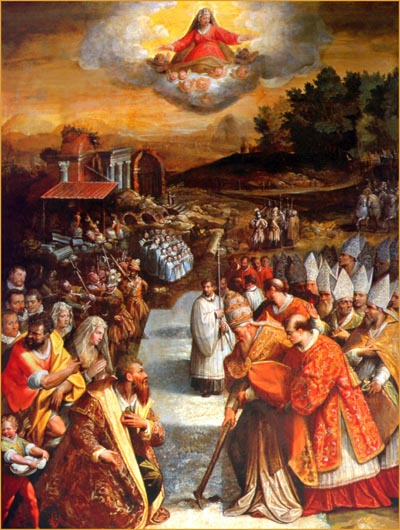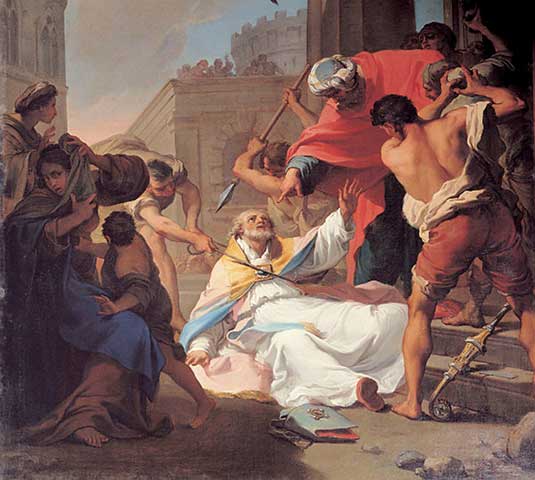

Pope Liberius is best known for building the Basilica of St. Mary Major after the miraculous snow.
When asked to tell the names of the Saints who were foremost in defending the dogma of the Incarnation, we think at once of the intrepid St. Eusebius of Vercelli, as one of the glorious number. The Catholic Faith, which was so violently attacked in the fourth century by the Arian heresy, was maintained at that time by the labors and zeal of four Sovereign Pontiffs: St. Sylvester, who confirmed the decrees of the Council of Nicaea; St. Julius, the supporter of St. Athanasius; Pope Liberius, whose faith failed not, and who, when restored to liberty, confounded the Arians; and lastly St. Damasus, who destroyed the last hopes of the heretics. One of these four Pontiffs appears on our Advent calendar—St. Damasus, whose feast we kept on December 11. The four Popes have for their fellow-combatants, in this battle for the Divinity of the Incarnate Word, four great Bishops, of whom it may be said that the defense of the dogma of the Consubstantiality of the Son of God was what they lived for, and that to say anathema to them was to say anathema to Christ Himself; all four most powerful in word and work, lights of the Churches of the world, objects of the people's love, and the dauntless witnesses of Jesus. The first and greatest of the four is the Bishop of the second See of Christendom, St. Athanasius, the Patriarch of Alexandria; the second is St. Ambrose of Milan, whose feast we kept on the 7th of this month; the third is the glory of Gaul, St. Hilary, Bishop of Poitiers; the fourth is the ornament of Italy, St. Eusebius, Bishop of Vercelli, whom we have to honor today. St. Hilary will come to us during Christmastide, and will stand at the crib of the Word, whose Divinity he so bravely confessed; St. Athanasius will meet us at Easter time, and help us to celebrate, in the triumphant Resurrection, Him Who he proclaimed as God in those dark times, when human wisdom hoped to destroy, by fifty years of peace, that Church which had survived the storm of three centuries of persecution. St. Eusebius' place is Advent; and Divine Providence has thus chosen him as one of the patrons of the faithful during this mystic season. His powerful prayers will help us to come devoutly to Bethlehem, and see in the Child, that is lying there, the eternal Word of God. So great were the sufferings which he had to undergo for the Divinity of Jesus, that the Church awards him the honors of a Martyr, although he did not actually shed his blood. Let us now listen to the admirable account which the Church gives us of his life:
St. Eusebius, by birth a Sardinian, was a lector in the Church at Rome, and afterwards Bishop of Vercelli. It may well be said that it was God Himself Who chose him to be the pastor of this Church; for the electors, who had never before seen him, no sooner set their eyes upon him, than they preferred him before all their fellow-citizens; and this instantly, and as soon as they first saw him. St. Eusebius was the first of the Bishops in the western Church, who established monks in his Church to exercise the functions of the clergy; he did this in order that he might thus unite, in the same persons, the detachment from riches and the dignity of Levites. It was during this time that the impious doctrines of the Arians were devastating the whole of the west; and so vigorously did St. Eusebius attack them, that Pope Liberius' greatest consolation was the unflinching faith of this holy man. It was on this account that the same Pope, knowing that the Spirit of God burned in St. Eusebius' soul, commissioned him to go, accompanied by his legates, to the Emperor, and plead the cause of the true Faith. Eusebius and the legates being come before Constantius, the Saint pleaded so powerfully, that the Emperor granted what he asked, namely, that a Council of the bishops should be convened.
That Council was held the following year, at Milan; St. Eusebius was invited by Constantius to be present, which was what the legates of Pope Liberius had desired and begged. So far was he from being duped by the synagogue of the malicious Arians to side with them against St. Athanasius, that he openly declared from the first that several of those present were known to him to be heretics, and he therefore proposed that they should subscribe to the Nicene Creed before proceeding any further. This the Arians, infuriated with anger, refused to do; whereupon, he not only refused to subscribe to what was drawn up against Athanasius, but he also, by a most ingenious device, succeeded in having St. Dionysius the Martyr remove his name from the decree, which the craft of the Arians had induced the latter to sign. Wherefore, they being exceedingly angry against St. Eusebius, loaded him with injuries, and had him sent into banishment. The holy man, on his side, shaking off the dust from his feet, caring little either for the threats of the Emperor, or the sword which was held over him, submitted to banishment as to something which belonged to his episcopal office. Being sent to Scythopolis, he there endured hunger, thirst, blows, and sundry other punishments; he generously despised his life for the true Faith, feared not death, and gave up his body to the executioners.
 How much he had to put up with from the cruelty and insolence of the Arians, we learn from the admirable letters, full of energy, piety, and religion, which he addressed, from Scythopolis, to the clergy and people of Vercelli, and to other person of the neighboring country. It is evident from these letters that the heretics were unable by their threats or by their inhuman treatment, to shake his constancy, or to induce him by the craft of their flattery or arguments to join their party. Thence he was taken into Cappadocia, and lastly into Thebaïs of Upper Egypt, in punishment of his refusing to yield. Thus did he suffer the hardships of exile until the death of Constantius: after which he was allowed to return to his flock; but this he would not do, until he had assisted at the Council which was being held at Alexandria for the purpose of repairing the injuries done by heresy. This done, he traveled through the provinces of the east, endeavoring, like a clever physician, to restore to perfect health such as were weak in the Faith, by instructing them in the doctrine of the Church. Animated by the like zeal for the salvation of souls, he passed over into Illyricum; and having at length returned to Italy, that country put off its mourning. He there published the commentaries of Origen and Eusebius of Caesarea on the Psalms, which two works he translated from the Greek into Latin, with such corrections as were needed. At length, having rendered himself celebrated by a life spent in such actions as these, he died at Vercelli, in the reign of Valentinian and Valens, and went to receive the immortal crown of glory which his so many and great sufferings had merited for him.
How much he had to put up with from the cruelty and insolence of the Arians, we learn from the admirable letters, full of energy, piety, and religion, which he addressed, from Scythopolis, to the clergy and people of Vercelli, and to other person of the neighboring country. It is evident from these letters that the heretics were unable by their threats or by their inhuman treatment, to shake his constancy, or to induce him by the craft of their flattery or arguments to join their party. Thence he was taken into Cappadocia, and lastly into Thebaïs of Upper Egypt, in punishment of his refusing to yield. Thus did he suffer the hardships of exile until the death of Constantius: after which he was allowed to return to his flock; but this he would not do, until he had assisted at the Council which was being held at Alexandria for the purpose of repairing the injuries done by heresy. This done, he traveled through the provinces of the east, endeavoring, like a clever physician, to restore to perfect health such as were weak in the Faith, by instructing them in the doctrine of the Church. Animated by the like zeal for the salvation of souls, he passed over into Illyricum; and having at length returned to Italy, that country put off its mourning. He there published the commentaries of Origen and Eusebius of Caesarea on the Psalms, which two works he translated from the Greek into Latin, with such corrections as were needed. At length, having rendered himself celebrated by a life spent in such actions as these, he died at Vercelli, in the reign of Valentinian and Valens, and went to receive the immortal crown of glory which his so many and great sufferings had merited for him.
Valiant soldier of Jesus, St. Eusebius, Martyr and Pontiff, how much labor and suffering thou didst undergo for the Messias! And yet, they seemed to thee to be little in comparison with what is due to this eternal Word of the Father, Who, out of His pure love, has made Himself the Servant of His own creatures, by becoming Man for them in the mystery of the Incarnation. We owe the same debt of gratitude to this Divine Savior. He is born in a stable for our sake, as He was for thine; pray, therefore, for us that we may resist our temptations and evil inclinations with that same firmness wherewith we would wish to confess His Name before tyrants and persecutors. Obtain for the Bishops of our Holy Mother the Church such vigilance, that no false doctrines may surprise them, and such courage that no persecution may make them yield. May they be faithful imitators of the Divine Pastor, Who gives His life for His sheep; and may they ever feed the flock entrusted to them in the unity and charity of Jesus Christ.
Contact us: smr@salvemariaregina.info
Visit also: www.marienfried.com